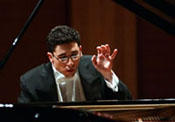After finishing 4th at the Cleveland and 5th at the Busoni, Spencer Myer waxes philosophical:
"After doing so many competitions, and seeing people who play the loudest and fastest come out on top, you begin to think that maybe that's what you will have to do. But what you really have to do is be true to yourself, because sooner or later it's going to strike a chord."
Hopefully, it does strike a chord at the APA Competition which is his next push.
And then there's the money thang:
"If I can possibly sustain myself just performing, I would like to do that. My other love -- which I do a lot of in New York City -- is accompanying singers. If I'm at a slow point in performing, I would rather accompany singers and instrumentalists than teach."
Read the rest
here.
And if you're interested Myer has an interesting, if less than polished, webpage that's worth visiting. check it out
here.


